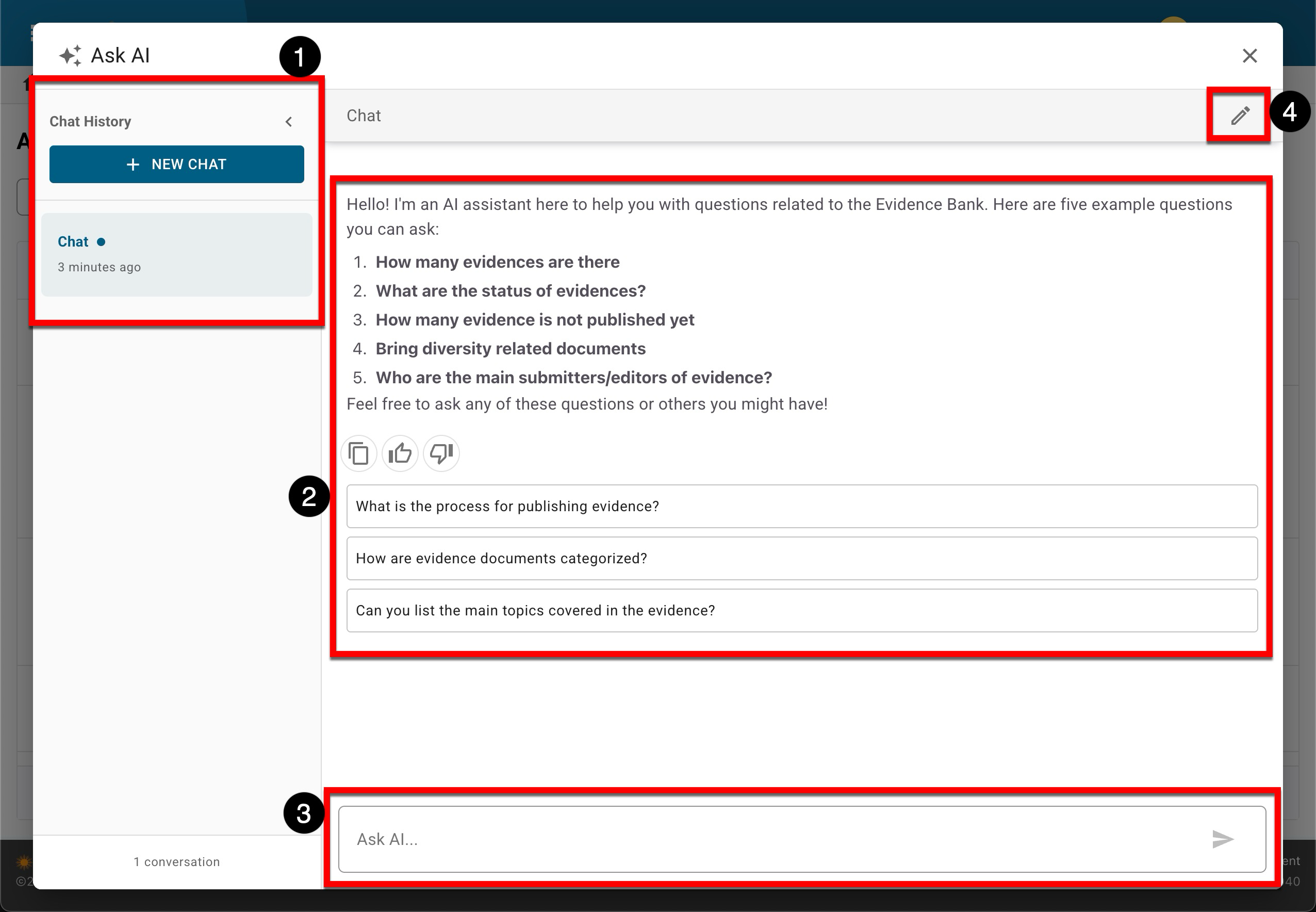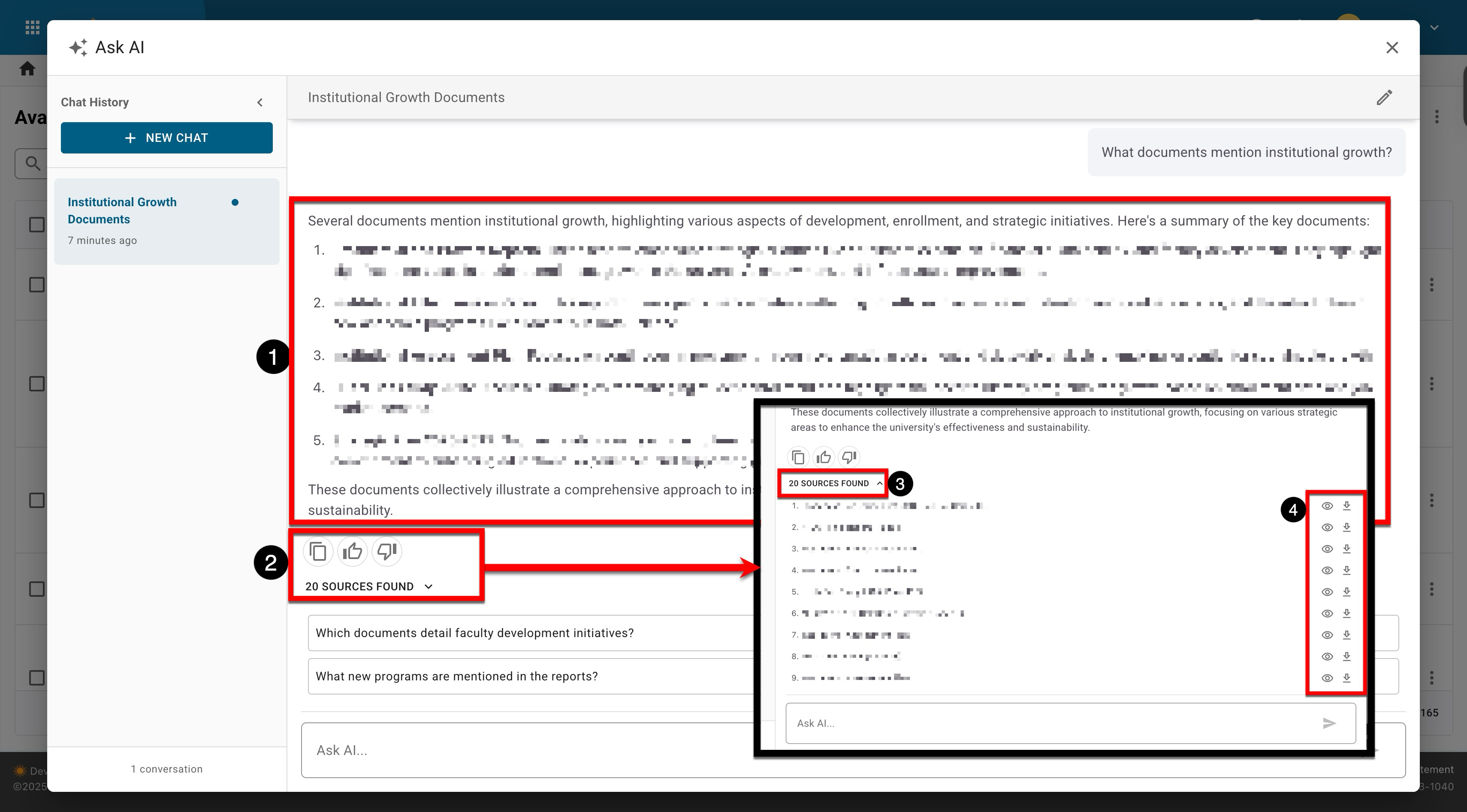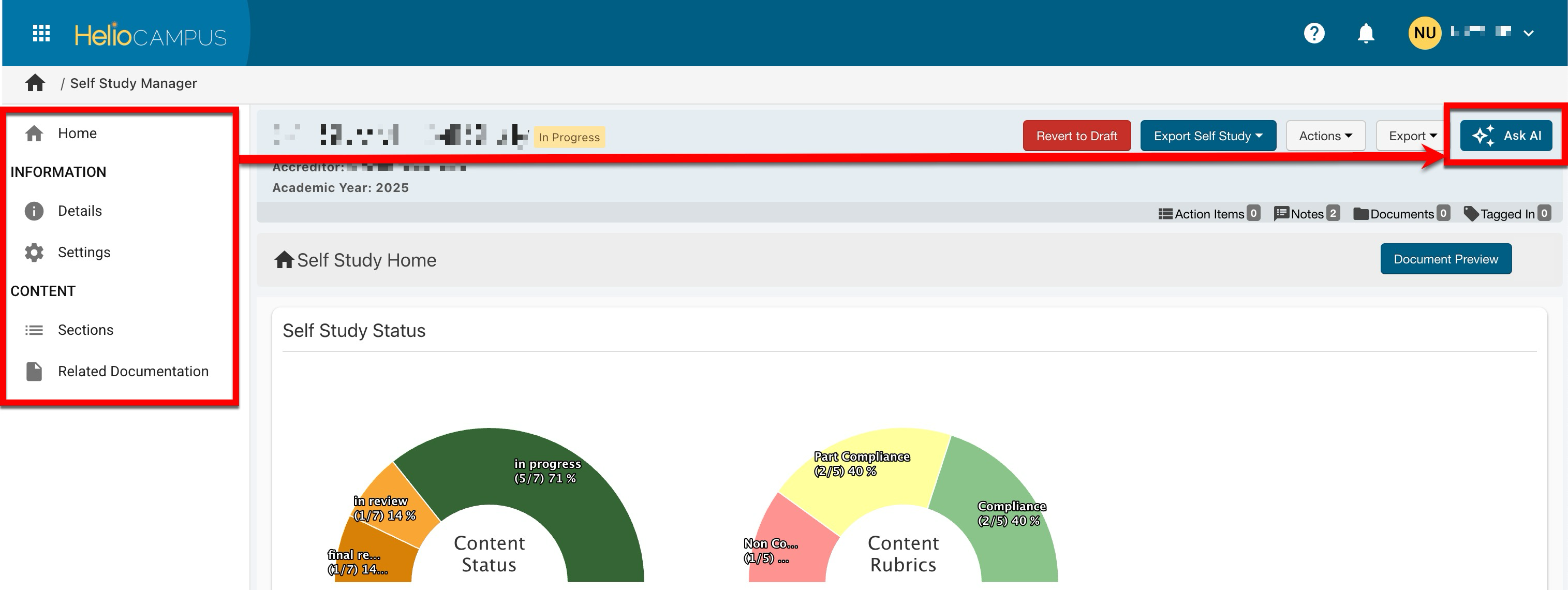📙 Knowledge Base Tip: Before using this functionality, users should be familiar with the Evidence Bank and the Self Study Homepage.
HelioCampus provides an AI-powered assistant with Ask AI functionality for both Self Study and Evidence Bank. HelioCampus must enable this functionality, and Institutions must provide users with role-based access to utilize the AI-powered assistant. Once HelioCampus has enabled the Ask AI feature and the AI user role has been assigned, the functionality will be available on the Evidence Bank page, the Self Study Homepage, and all pages within a self study.
If a user has previously used the AI Assistant, chat history will be displayed (1). Clicking New Chat will save the existing chat/topic and open a new chat (1). As a best practice, a new chat should be started for new topics to ensure the AI has the appropriate context. The AI Assistant displays guidance for its use and example questions, as well as some suggestions of what to ask (2). The AI Assistant can be asked questions about information displayed within the evidence bank or self study (3). To personalize chats for easier locating in chat history, they can be renamed by editing the title (4)

The AI provides its answer directly below the question (1). In the example below, a multi‑item list and a concluding sentence about the listed documents collectively illustrate an approach to the question of institutional growth and sustainability. Providing feedback via the thumbs-up/thumbs-down (2) options helps to identify AI responses that are not satisfactory and contributes to overall AI generation. Sources used in the AI Assistant’s answer can be reviewed by expanding the sources dropdown (3), and each source utilized in the answer can be previewed or downloaded (4).

Enabling Ask AI
-
Submit a support ticket to request that Ask AI for Self Study and Evidence Bank be enabled for the Institution. Learn about contacting support.
-
Once Ask AI has been enabled, Institutions must provision role-based access to users to allow access to the functionality. Users should be assigned the Evidence Bank AI User from the General category when provisioning access.
-
User roles can be added individually per user or in bulk via the platform interface. However, the Evidence Bank AI User cannot be assigned in bulk via the template export/import process. Learn about adding roles to individual users or in bulk via the platform interface.
-
-
After the Evidence Bank AI User role has been assigned to a user, the Ask AI functionality will become available to the user upon logging out and back into the Platform.
Evidence Bank
Once enabled and role-based access has been granted, the AI Assistant for the Evidence Bank is available by clicking 'Ask AI'. The AI accounts for evidence metadata, including titles and descriptions, submission information, standards/criteria, keywords, contact persons, dates, and versions. The AI can also read and analyze evidence documents to provide insights and answer both general questions and statistical questions about evidence data.

Product Tip
Evidence entries without file attachments or URLs cannot be processed by the AI. The AI requires actual documents to provide comprehensive answers. The AI only processes attached documents, not URL-based evidence. Entries containing URLs and/or no file attachments will result in incomplete AI responses.
Self Study Homepage
Once enabled and role-based access has been granted, the AI Assistant for the Self Study is available on all pages of a self study by clicking 'Ask AI'. The AI accounts for and analyzes all self study content to provide insights and answer both general questions and statistical questions about self studies.
-
Metadata Analysis: Analyzes metadata in files within the Related Documentation page.
-
Self Study Content Analysis: Answers questions about the text entered into the self study itself.
-
Statistical Questions: Answers statistical questions about self study data.
-
Section Information: Queries information displayed on Self Study Sections pages, including content titles, statuses, editors, approvers, rubric scores, feedback, update history, and more.

Frequently Asked Questions
Who can access the AI assistant? -
Access depends on user roles in Evidence Bank and Self Study modules, with specific permissions for Evidence Bank Curator, Contributor, Self Study Chair, Section Editor, etc. These roles take precedence over the EvidenceAI role.
What type of questions can the AI assistant answer?
AI can answer questions about evidence metadata, self study content, and statistical information. It's equipped to handle data-driven insights and analysis of institutional information.
What information does the AI have access to?
AI can read document content and metadata like titles, statuses, and dates, but currently only reads documents and content within a self study. It cannot read images or videos.
Does the AI work with URLs in evidence entries? -
Currently, if a user enters a URL instead of a document, the AI doesn't index that URL content. The AI only processes attached documents, not URL-based evidence. URL content will result in incomplete AI responses.
How does AI handle evidence versioning?
When evidence is updated in the Evidence Bank, the AI will work with the current version, but there may be timing considerations based on when evidence updates are processed.
What happens if evidence has no supporting documents?
AI can potentially help identify which evidence entries lack documents or URLs, allowing clients to address gaps in their evidence repository.
